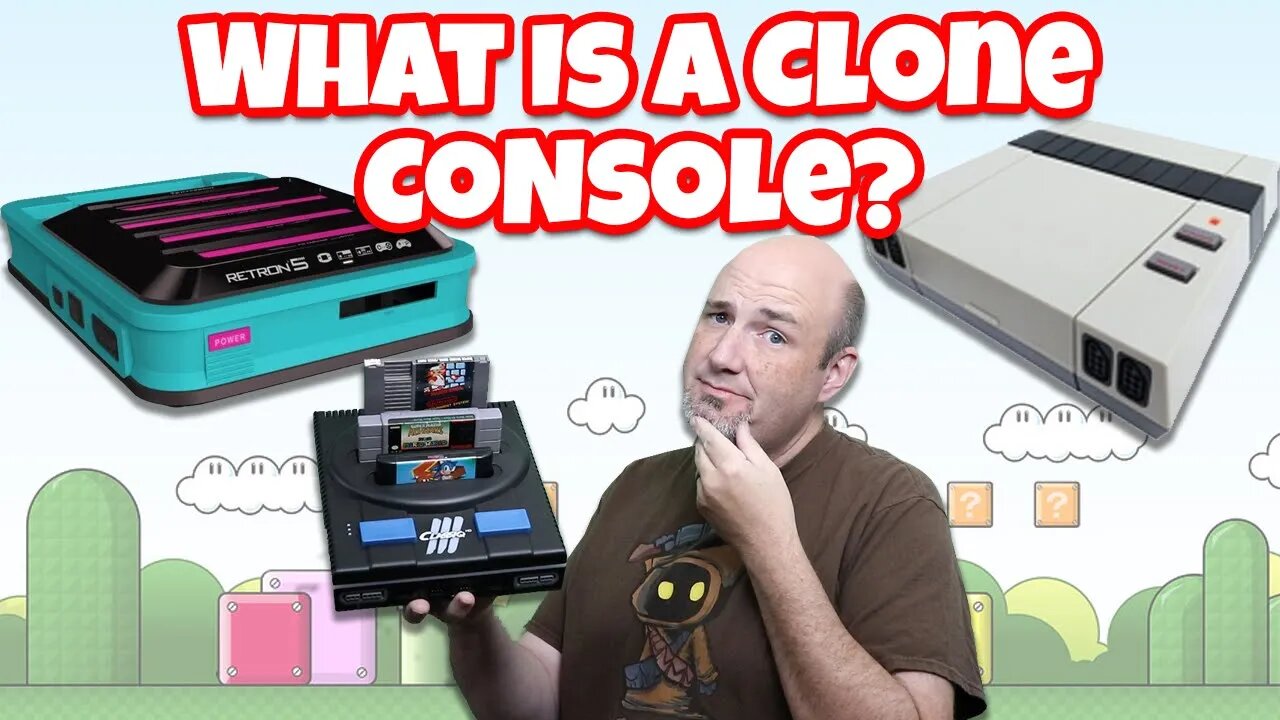Premium Only Content

Understanding Clone Video Game Systems - SoC Vs Emulation Vs FPGA
In this episode, we break down and explain what a clone video game system is, a bit about how they work, and how the major technologies differ from each other.
A clone video game system is a third-party piece of hardware that allows you to play games from Nintendo, Sega, or others using unofficial hardware. There are a few ways to do this, and each implementation has its strengths & drawbacks, and we're going to try to help explain what goes into a clone console.
SoC- System on a Chip
Most budget video game clone systems under $150 utilize some sort of system on a chip or SoC. A system on a chip essentially reproduces the functionality of all the hardware in one integrated circuit. These have been around for decades at this point, & are relatively inexpensive to produce. If it is inexpensive and emulates the hardware using just one or a few circuits what's the downside? Game authenticity often suffers from this implementation. Most of these SoCs suffer from what is called a reverse duty cycle issue which negatively impacts the audio. This leads to games not sounding correct. SoC's also have inaccurate color palettes which can make games look wrong, and games compatibility is an issue. I do not know of any SoC system that will get past level 2 in Battletoads, & things like the Famicom Disk System will not work. But when you can get an HDMI-equipped NES clone with an SoC for under 30 bucks, sometimes you're willing to make some concessions.
Emulation
Where systems with an SoC replicate the performance of the original system through hardware, there are some systems that do so via software. These systems, most often from Hyperkin, utilize a software front to download the game ROM from a cartridge into local system memory. From here, you can play the game as normal and even apply some cool trickery. For example, you can install a translation pack from an SD card to play Japanese language games in English! I've done this, it's pretty cool! Some incorrectly believe 2-in-1 or 3-in-1 systems use software emulation. That is simply not the case. While systems like the Retron 5 really popularized the idea of using software as the backbone of their system, it is not a requirement to do more than one hardware clone and a device.
So with everything that software emulators can do, that sounds like the way to go, right? Well, not exactly. You still often have game compatibility issues, especially if you are trying to load a cartridge that the operating system doesn't recognize or have somewhere loaded into a database. You also have accessory compatibility issues, often things like the Game Genie doesn't work, or the Famicom Disk System. Load times can be incredibly long for some games. And on systems like the Retron SQ, the overall experience doesn't quite feel finished.
FPGA
A field programmable gate array, or FPGA, is perhaps the most accurate means of hardware replication you can find. It uses a combination of hardware and software to mimic the performance of the original console and does so brilliantly. Out of all of the hardware types out there, this is most definitely the most customizable and the most accurate. You don't have the sound issues that you do with SoCs, you don't have the games compatibility issues that you do with emulators, it is as if you are running actual hardware with the ability to output clean, crisp images and accurate audio.
Many FPGAs, such as the Retro USB AVS, are also compatible with accessories that other systems are not, such as the Famicom Disk System! So why doesn't everyone just use an FPGA? For starters, FPGA systems start at $200 & only plays a single system. Production quantities are also an issue. Manufacturers such as Analogue and Retro USB have a hard time keeping products available.
So which one is right for you?
A lot of deciding on what system is best for you comes down to your budget. If you are looking for the least expensive system possible, a system on a chip is the way to go. You get decent functionality, often with HDMI output, but you do compromise game visual and audio accuracy. Some systems also introduce excessive lag which can negatively impact gameplay.
Emulation systems introduce a new level of complexity, however, unlock features such as different filters and translation patch options. Sometimes, however, you can run into issues with the way the software is implemented which can cause load issues, game compatibility issues, and other issues. Emulation-based systems are also more expensive, so if you're on a budget it may be more than you're willing to spend to play your copy of Super Mario Bros.
If you are looking for the most accurate gameplay experience out there and budget is of no concern, an FPGA is the most accurate way to play, with the best visuals, the best audio, and the best game compatibility. FPGA systems are simply beautiful, but that beauty comes at a cost. If you are willing to spend, this is the best overall experience you will have.
-
 12:21
12:21
RoXolidProductions
5 months ago $0.03 earnedALL-NEW Nintendo Switch, DS & 3DS Game & System Cleaning Kits!
1734 -
 LIVE
LIVE
TheBedBug
4 hours ago🔴 LIVE: EPIC CROSSOVER - PATH OF EXILE 2 x MARVEL RIVALS
1,135 watching -
 1:12:45
1:12:45
The Quartering
2 hours agoTerror In New Orleans, Attacker Unmasked, Tesla BLOWS UP At Trump Tower! Are We Under Attack?
43.2K54 -
 1:32:08
1:32:08
Robert Gouveia
4 hours agoNew Year TERROR; Trump Speaks at Mar-a-Lago; Speaker Johnson FIGHT
35.4K25 -
 22:21
22:21
Russell Brand
1 day agoVaccines Don't Cause Autism*
118K590 -
 2:05:27
2:05:27
The Dilley Show
4 hours ago $14.79 earnedNew Years Agenda, New Orleans Terror Attack and More! w/Author Brenden Dilley 01/01/2025
56.3K17 -
 25:45
25:45
Outdoor Boys
2 days ago3 Days in Arctic Survival Shelter - Solo Bushcraft Camping & Blacksmithing
44.6K17 -
 2:59:05
2:59:05
Wendy Bell Radio
10 hours agoAmerica Is Back
95.6K106 -
 1:45:57
1:45:57
Tucker Carlson
5 days agoAaron Siri: Everything You Should Know About the Polio Vaccine, & Its Link to the Abortion Industry
131K174 -
 1:46:38
1:46:38
Real Coffee With Scott Adams
5 hours agoEpisode 2707 CWSA 01/01/25
42.4K26